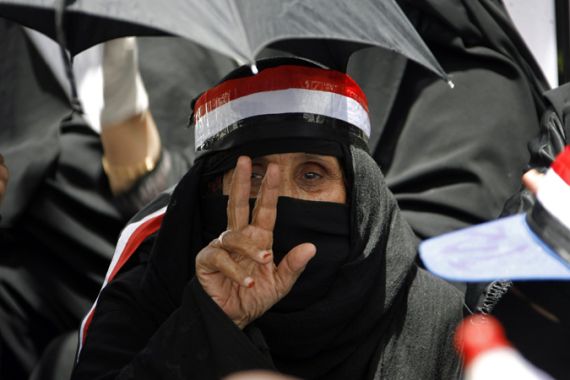International pressure mounts on Yemen leader
US calls for a negotiated transition of power “as quickly as possible” after more bloodshed in anti-government protests.

International pressure is mounting on Yemen’s president Ali Abdullah Saleh to step down, after the deaths of at least 19 people in anti-government protests in the last two days.
Strong statements from the United States, United Nations and European Union countries came as Saleh backers clashed with protesters in the capital, Sanaa, and security forces opened fire during protests in the southern city of Taiz on Tuesday.
The official SANA news agency said four people were killed in Sanaa and dozens injured.
Ban Ki-moon, the UN secretary-general, told Saleh in a telephone call that he sent a small team to determine how the world body could best help quell tensions.
The UN chief’s office said Ban “expressed strong concerns for the dead and the injured, and urged utmost restraint from both government and opposition’s forces”.
Meanwhile, the Pentagon said the US was calling for a negotiated transition in Yemen “as quickly as possible”.
“Obviously the situation right now is a difficult one. The longer it festers, the more difficult it becomes,” Geoff Morrell, the Pentagon Press Secretary said.
More than 120 people have been killed and 5,000 injured since Yemen’s protests started on February 11, inspired by the popular uprisings in Tunisia and Egypt.
‘Indiscriminate violence’
Jay Carney, the White House spokesman, said in a statement that the US “strongly condemns the use of violence by Yemeni government forces against demonstrators in Sanaa, Taiz, and Hodeida in the past several days”.
“We call upon the government of Yemen to conduct full investigations into these events and to hold those responsible accountable for their actions,” the statement said.
|
“In early March, President Saleh promised to maintain maximum restraint in the use of the Yemeni security forces in controlling peaceful demonstrations. We strongly urge him to keep that promise.” William Hague, British foreign secretary |
In London William Hague, the British foreign secretary, said he was appalled by the bloodshed and condemned the “indiscriminate violence” of security forces.
“In early March, President Saleh promised to maintain maximum restraint in the use of the Yemeni security forces in controlling peaceful demonstrations. We strongly urge him to keep that promise,” he said.
And Italy urged Sanaa to “cease all forms of violence” against demonstrators and to open the way for “a constructive dialogue as soon as possible with those who are peacefully calling for a new season of reforms”.
The statements came as President Saleh urged the opposition to join talks in Saudi Arabia to try to end the unrest.
The Gulf Cooperation Council (GCC) invited government and opposition representatives on Monday to talks in Saudi Arabia, at a date yet to be set.
Urging talks
Saleh, who ignored a transition-of-power plan offered by the opposition on Saturday, accepted the Arab Gulf states’ invitation on Tuesday and urged the opposition to follow suit.
“I promise that we will make every effort to return things to normal through talks with rational people from the Joint Meetings Party,” he said, referring to the opposition coalition.
“We repeat our invitation to them to sit at the table of dialogue and we call for a restraint from violence.”
Aides to a dissident general, Ali Mohsen, who turned against Saleh last month, said he had also accepted the call for talks in Saudi Arabia. But the coalition was non-committal.
“We welcome the [GCC] position on respecting the Yemeni people’s choices and we will also welcome any efforts made for the sake of President Saleh’s speedy departure,” Mohammed al-Sabri, the Joint Meeting Parties coalition spokesman said.
Separately on Tuesday, General Mohsen accused forces loyal to Saleh of trying to kill him in an ambush in which an unspecified number of other people lost their lives.
Members of the presidential guard, who had masqueraded as part of a delegation of tribal envoys visiting the headquarters of the general’s rebel division, pulled out weapons and opened fire on the general, his office said.